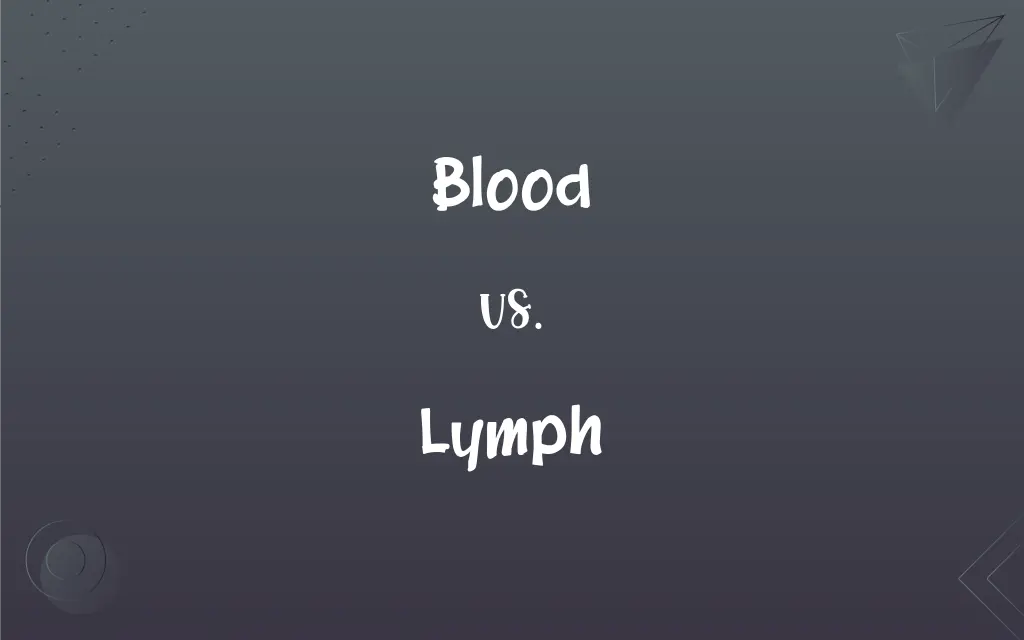Blood vs. Lymph: What's the Difference?
Edited by Janet White || By Harlon Moss || Updated on October 17, 2023
Blood is a red fluid circulating in the heart and vessels, delivering oxygen and nutrients. Lymph is a clear fluid in lymphatic vessels, aiding in immune responses and filtering waste.

Key Differences
Blood is the life-sustaining fluid in humans and many animals that circulates through the heart, arteries, veins, and capillaries. It's responsible for transporting oxygen, nutrients, hormones, and waste products throughout the body. On the other hand, lymph is a clear or whitish fluid that travels through the lymphatic system, playing a key role in maintaining body fluid levels and participating in immune functions.
A significant component of blood is the red blood cells, which are crucial for oxygen transportation. Blood also contains white blood cells, platelets, and plasma, each serving distinct roles from immunity to clotting. In contrast, lymph derives from interstitial fluid and contains white blood cells, especially lymphocytes, which are essential for immune reactions.
While blood operates in a closed circulatory system, under pressure due to the heart's pumping action, lymph moves in a one-way system that begins at tissue spaces and ends at veins near the heart. This lymphatic system relies on muscle contractions, valves, and external compressions to propel lymph.
Blood has multiple functions, including temperature regulation, pH balance, and protection against infections and diseases. Its components are produced mainly in the bone marrow. Conversely, lymph filters harmful substances, like bacteria, from body tissues, and its nodes produce and store cells that fight infection and disease.
Both blood and lymph play crucial roles in the body's health and function. While blood is essential for sustenance and waste removal, lymph assists in defending the body against infections and maintaining fluid balance.
ADVERTISEMENT
Comparison Chart
Composition
Red and white cells, platelets, plasma
Clear fluid with white cells (mainly lymphocytes)
Function
Oxygen & nutrient transport, defense
Immune responses, fluid balance, waste filtering
System Type
Closed circulatory system
Open, one-way lymphatic system
Main Production Site
Bone marrow
Lymph nodes
Appearance
Red due to hemoglobin
Clear or whitish
ADVERTISEMENT
Blood and Lymph Definitions
Blood
A means of familial or ancestral connection.
They shared the same blood, being siblings.
Lymph
Fluid passing through the lymphatic system's channels and nodes.
Lymph circulation is vital for filtering out toxins.
Blood
The vital red fluid in vertebrates, transporting oxygen and nutrients.
The donation saved lives by providing needed blood.
Lymph
The liquid part of body tissues, crucial for immune functions.
Infections can obstruct the normal flow of lymph.
Blood
A body fluid containing cells, platelets, and plasma.
Doctors checked his blood for signs of anemia.
Lymph
A clear fluid transporting white blood cells, especially lymphocytes.
The swollen node indicated an active flow of lymph.
Blood
A substance crucial for clotting and immune defense.
The patient's blood showed elevated white cell counts.
Lymph
A defense fluid containing cells that combat pathogens.
Lymphocytes in the lymph are key for immune reactions.
Blood
A representation of life essence or vitality.
She felt the blood drain from her face in shock.
Lymph
A derivative of interstitial fluid collected by lymphatic vessels.
Edema can result when lymph doesn't drain properly.
Blood
The fluid consisting of plasma, blood cells, and platelets that is circulated by the heart through the vertebrate vascular system, carrying oxygen and nutrients to and waste materials away from all body tissues.
Lymph
A clear, watery, sometimes faintly yellowish fluid derived from body tissues that contains white blood cells and circulates throughout the lymphatic system, returning to the venous bloodstream through the thoracic duct. Lymph acts to remove bacteria and certain proteins from the tissues, transport fat from the small intestine, and supply mature lymphocytes to the blood.
Blood
A similar fluid in animals other than vertebrates.
Lymph
(Archaic) A spring or stream of pure, clear water.
FAQs
What is the main function of lymph?
Lymph aids in immune responses and helps maintain body fluid balance.
Can blood function without lymph?
While blood has its specific functions, lymph plays a crucial role in filtering waste and defending against infections.
What causes swollen lymph nodes?
Swollen lymph nodes can result from infections, inflammatory conditions, or cancers.
How is lymph formed?
Lymph is derived from interstitial fluid that bathes tissues and is collected by lymphatic vessels.
What role do red blood cells play?
Red blood cells transport oxygen from the lungs to body tissues.
What's the role of white blood cells in blood?
White blood cells defend the body against infections and diseases.
Why is blood donation important?
Blood donation helps save lives by providing blood for surgeries, trauma care, cancer treatment, etc.
What gives blood its red color?
Hemoglobin, a protein in red blood cells, gives blood its red color when bound to oxygen.
Can one survive without blood?
No, blood is vital for transporting oxygen, nutrients, and waste products.
What's the role of lymph in fat absorption?
Lymph absorbs and transports dietary fats from the intestines to the bloodstream.
How does blood clot?
Blood clotting involves platelets and clotting proteins present in plasma.
Does lymph have a pump like the heart for blood?
No, lymph relies on muscle contractions, valves, and external compressions to move.
Why don't we bleed lymph when cut?
Lymph vessels are not directly connected to the surface like blood vessels, so cuts primarily release blood.
Why are lymph nodes important?
Lymph nodes filter harmful substances and produce and store cells that combat infection.
Is lymph always clear?
Lymph is generally clear but can appear milky after absorbing fats from the intestines.
What type of cells primarily make up blood?
Blood is primarily composed of red blood cells, white blood cells, and platelets.
How do lymphocytes in lymph aid immunity?
Lymphocytes recognize and respond to foreign pathogens, playing a central role in immunity.
What happens when one loses too much blood?
Significant blood loss can lead to shock, organ failure, or even death.
Are there diseases related to lymph?
Yes, conditions like lymphedema, lymphoma, and lymphadenitis relate to the lymphatic system.
What gives blood its plasma component?
Plasma, the liquid part of blood, contains water, salts, enzymes, hormones, and waste products.
About Author
Written by
Harlon MossHarlon is a seasoned quality moderator and accomplished content writer for Difference Wiki. An alumnus of the prestigious University of California, he earned his degree in Computer Science. Leveraging his academic background, Harlon brings a meticulous and informed perspective to his work, ensuring content accuracy and excellence.
Edited by
Janet WhiteJanet White has been an esteemed writer and blogger for Difference Wiki. Holding a Master's degree in Science and Medical Journalism from the prestigious Boston University, she has consistently demonstrated her expertise and passion for her field. When she's not immersed in her work, Janet relishes her time exercising, delving into a good book, and cherishing moments with friends and family.































































